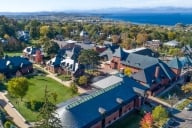You have /5 articles left.
Sign up for a free account or log in.
When the Department of State announced last month it was suspending Fulbright grants for Americans worldwide due to the COVID-19 pandemic, many grantees living abroad had to make difficult decisions quickly with incomplete and imperfect information.
With international borders closing to air traffic, commercial flight routes being canceled and the State Department urging Fulbrighters to return to the U.S. as soon as possible or risk being stuck in their host countries for an extended period, grantees had questions about their stipends and health insurance. Where would they live if they did return to the U.S.? What would they do for work, assuming they could even find jobs as millions of American companies and businesses shed workers during the economic downturn resulting from the public health crisis?
Participants in the State Department-funded Fulbright fellowships, a flagship program that provides grants for teaching and researching opportunities abroad, were not just losing prestigious grants and leaving behind unfinished research projects -- they were also losing incomes, housing and, in some cases, health insurance.
The program is paying grantees their stipends through June. This means grantees whose project terms correspond with the American academic year will receive all or most of the funds they were promised. But some of those whose grants started midyear and were scheduled to continue through the fall said they will not be getting thousands of dollars they were counting on.
Clémence Kopeikin, who was in Brazil on a Fulbright research grant to conduct a community-based program for youth focused on gender-violence prevention, said the premature end to her grant means she will lose more than $5,500 in funding she was counting on.
"My colleagues and I hope the Fulbright program will reverse their decision to cut funding and provide the rest of the grants as was stated in the contracts we signed," she said. "I do not consider it to be ethical to cancel programs and cut Fulbrighters' project funds/sources of income during a pandemic. Most of my research colleagues in other institutions around the world have switched to remote working and are shocked when I tell them that the our program was canceled, we were ordered to travel through mandatory evacuations and that most of us are now looking for work."
Jenny Lundt, a recent Colgate University graduate who arrived in Malaysia in January for what was supposed to be a 10-month Fulbright English teaching assistant grant, said she and other grantees in her position made financial decisions based on commitments made by the program.
"They guaranteed us housing. We got a car," she said of her Fulbright cohort. Now back in the U.S., she says, "I have no savings. I moved back in with my mom, putting my family at risk. I don’t have enough money to rent someplace or self-isolate, and no one is hiring right now."
Still, Lundt said she's better off than other grantees.
“I’m definitely in a more privileged position. I’m still on my parents’ health care, and my parents have made it work for me. Other people in my cohort don’t have that luxury whatsoever.”
The Fulbright program recommends grantees maintain private insurance coverage over and above the accident and sickness policy it provides, but not everyone does. A number of grantees, including Sean Hayward, said they came back to the U.S. during a pandemic without health insurance.
Hayward would have much preferred to stay in Indonesia, where he was studying traditional music from the Banyumas region.
"I have a house [in Indonesia] which is very well-suited to quarantine. I had it completely stocked. I had health insurance, a vehicle, a house full of musical instruments and possessions. It was highly preferable for me to stay," said Hayward, who is a doctoral candidate in music at the California Institute of the Arts. He said he left mainly because he received information from Fulbright officials indicating he would likely lose his research visa if he stayed, though he said he has since learned that would not have been the case.
“My rent in Indonesia for my house is $80 a month, and it’s already paid through the year,” said Hayward, who is currently staying in an Airbnb for a quarantine period after his travels from Indonesia to California took him through four major airports. “Basically, my grant amount is roughly $1,700 a month, which is quite plentiful in Indonesia, but [for] living in Los Angeles it is nowhere close [to] enough to live."
He said apartment hunting in the midst of a pandemic is obviously not ideal. He also has no hope of finding work in his field as a university lecturer any time soon.
The Fulbright program has said the “health, safety, and well-being of program participants” is its “highest priority.” With the pandemic rapidly worsening and borders closing, the department acted quickly and in unprecedented fashion in suspending all programs worldwide. The Department of State on March 19 issued a worldwide travel alert urging all Americans living abroad in places where commercial flights were still available to return to the U.S. immediately or be prepared to stay abroad indefinitely.
A State Department official said in a written statement that the department’s Bureau of Educational and Cultural Affairs “has repeatedly urged and offered assistance to American Fulbright participants to depart from their overseas locations for several weeks. On February 28, March 11, and March 19 the State Department reiterated calls for Fulbright participants to return home and offered to assist and fully fund the cost of travel.”
“The bureau offered to help arrange their travel, including paying any increased transportation costs, provided stipends through June 30 for all Fulbrighters to aid in their transition, and assured all participants that they would retain alumni status of their programs," the official said.
Ushered Into Alumni Status
The alumni status, which confers grantees a prestigious title for their résumés and access to the Fulbright alumni network, is little comfort to some now-former Fulbrighters.
“We are not being given the opportunity to resume our work after the pandemic is over. We are Fulbright alumni and that’s it,” said Hayward. “For most of us the title of alumni is not as meaningful as the work itself. For me the money is not as meaningful as the work itself. I didn’t choose to become an experimental Indonesian music composer for the cash.”
Maia Evrona, a writer and translator whose grant provided funding her to study the Jewish poetic tradition in Greece and Spain, has called for Fulbright to offer new "makeup" grants to people whose grants were cut short this year.
“This would be unprecedented, but this crisis and the program’s response to it were also unprecedented,” Evrona wrote in an article in the Los Angeles Review of Books.
“The predominant emotion I am hearing from other Fulbrighters is that they just want to finish their projects,” Evrona said via email. “Many people are angry with the Fulbright program for going ahead with next year's grants before they have fulfilled their commitment to current Fulbrighters.”
She also said people also are angry because they felt that traveling put them in more danger than sheltering in place would have.
Natalia Roman, who has asthma, initially wanted to stay in Colombia, where she was a Fulbright English teaching assistant, but instead returned to Puerto Rico via a 27-hour flight that took her through four airports. On her journey back, she wore a sign on her back saying “Chronic Asthma Patient -- Please Keep Your Distance.”
Roman does not have health insurance in Puerto Rico, and she was fearful for her health traveling during a pandemic. Still, she said, “looking back, I think it was the right decision to get us out while we could because a lot of people are stuck in different countries. Things in Colombia aren’t looking great, and there is a certain level of security that each of us feels being with our parents and being with our significant other and knowing that even if borders close, it's not as if we’re stuck anywhere other than where we’re supposed to be,” she said.
Some Fulbrighters have chosen to stay on in their host countries as private citizens. Matthew Ehrlich, a Ph.D. candidate in history at the University of California, San Diego, and his wife, Kelsey Wood, opted to stay in Spain on tourist rather than research visas after Ehrlich's Fulbright grant prematurely ended.
Ehrlich was using his Fulbright to do dissertation research on the 19th-century Spanish empire and said he’s relieved to be getting funding through June and to have Fulbright alumni status. But he said lack of clarity about those details complicated his decision making when he and his wife were trying to decide what to do.
“We felt this sword of Damocles hanging over our heads,” he said. “We couldn’t think with a clear head about what was genuinely best for our health, our safety, our families, the right thing to do globally, because of this fear that we would lose our funding and lose our status.”
Requirement to Return Stipend
The Fulbright program is not the only U.S. government-sponsored grant for international research and study. Frankee Lyons, a doctoral candidate in history at the University of Illinois at Chicago, went to Poland with funding from the State Department’s Title VIII program, which funds research and language instruction in Eastern Europe, Eurasia and Russia, in addition to funding from the Fulbright program.
Lyons, who studies Polish-Jewish life in the 1950s under Communism, is pleased with how Fulbright officials in Poland handled the pandemic. But Lyons is very unhappy that the American Councils for International Education -- a nonprofit organization that administers her Title VIII grant -- is requiring her to repay about $6,000 for her housing and living stipend for the remaining three months of her now-canceled grant.
Graham Hettlinger, an American Councils official, wrote to Lyons and informed her she could keep the housing portion of the stipend to pay for outstanding lease payments if she returned to the U.S., but not if she stayed in Poland -- "as doing so would effectively be to continue a program that, by our own assessment, we were obligated to cancel in order to protect the health of our participants."
Hettlinger, the managing director of higher education programs for American Councils, defended the requirement to return the money in a March 25 letter to Lyons, saying the terms of the grant “include the requirement that a pro-rated portion of housing and living stipends be returned to the funder if a scholar’s time abroad is reduced for any reason from the original time allotted.”
“After that I went back to the terms and conditions,” said Lyons. “It doesn’t say ‘for any reason.’ There are clear sections in the contract that say under what conditions it must be returned, and those are if the grantee withdraws, is dismissed or is medically evacuated, and none of those things happened. The program was canceled by them. I wasn’t dismissed; I didn’t withdraw.”
“I don’t know what I’m going to do going forward with this,” said Lyons, who remains in Poland. “I’m also really concerned one this is my livelihood for the next three months. I didn’t violate my contract, and I feel I’ve been mistreated.”
Hettlinger, of American Councils, said via email that the terms and conditions of the grant say that fellowships can be canceled or shortened and fellows asked to return early due to circumstances beyond their control.
"Throughout these events, American Council’s first priority has been to protect the health and safety of our program participants by keeping them well informed of ongoing developments in the COVID-19 crisis, and, as required by conditions, arranging their safe and timely return home," he said. "We certainly feel for those of our Title VIII scholars who have had to abbreviate their research time abroad due to these events, and we recognize that the shortening of their awards has had unfortunate financial implications for many."








